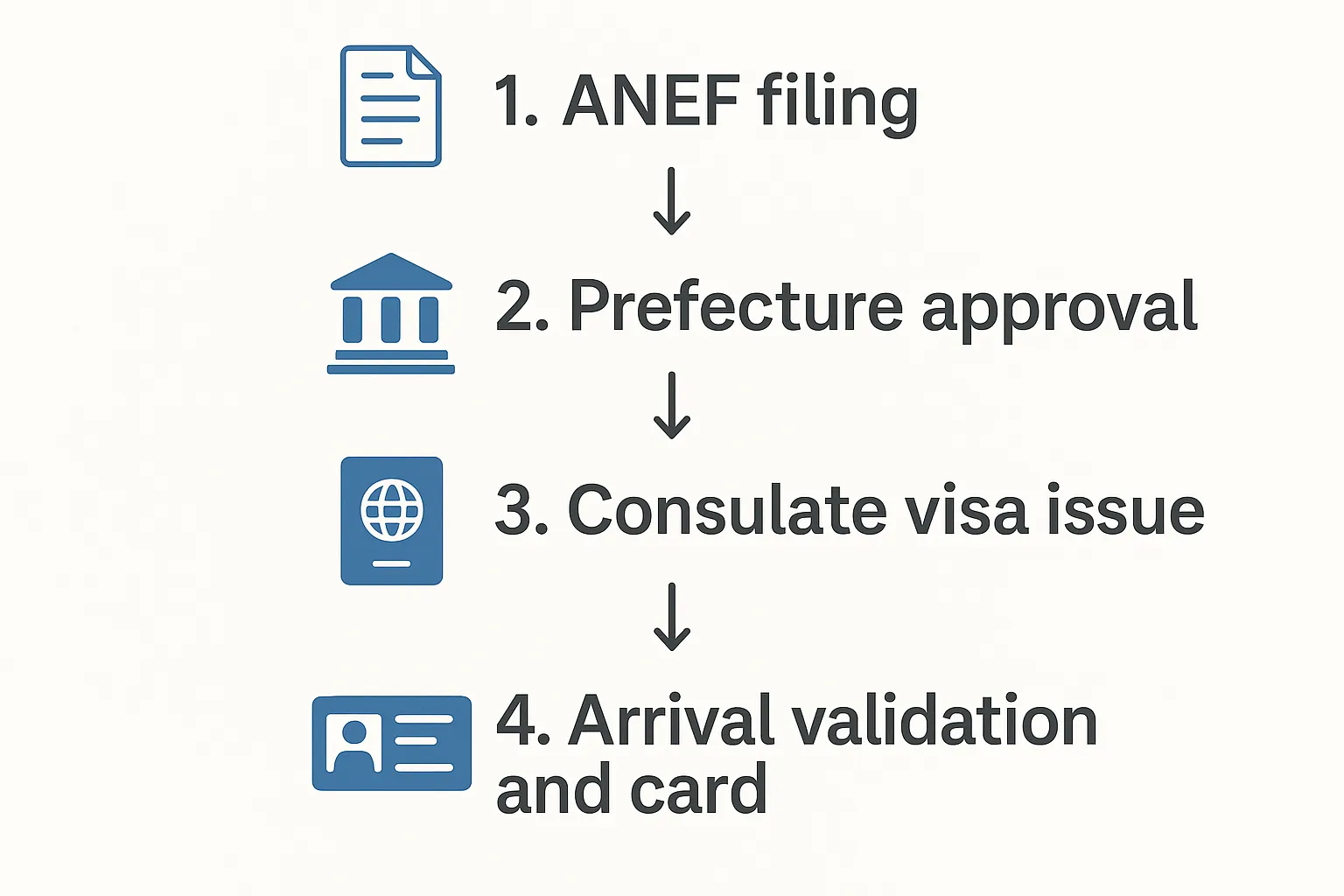Employer Guide to Intra-Company Transfer (ICT) Permits in 2025

In 2025, French subsidiaries that need to bring in key talent from a parent company abroad have a streamlined but tightly regulated path: the Intra-Company Transfer (ICT) residence permit. While the permit has existed since 2016, the 2025 Immigration and Integration Act and the full rollout of the ANEF online portal have reshaped procedures, timelines, and compliance checks. This employer-focused guide explains exactly how to secure an ICT card for your non-EU staff and keep your organisation on the right side of CESEDA and labour-law inspectors.

1. ICT Permit at a Glance
- Purpose: Temporary secondment of managers, specialists, or graduate trainees employed by a company outside the EU to a group entity in France.
- Validity: Up to 3 years for managers/specialists, 1 year (renewable once) for trainees.
- Legal basis: Articles L.432-1 to L.432-7 and R.432-1 to R.432-13 CESEDA, transposing EU Directive 2014/66/EU.
- Digital platform: All applications must now be filed on the ANEF-Employeur module – paper dossiers are no longer accepted.
- Quotas: ICT permits are exempt from the 2025 national work-permit quota system explained in our work-permit quota guide.
2. Eligibility Checklist
| Requirement | Details | Practical Tips |
|---|---|---|
| Group relationship | Host entity in France and home employer abroad must be part of the same corporate group (direct or indirect control >50 %). | Upload the entire share-ownership chain in one PDF to avoid ANEF rejections. |
| Seniority | Employee must have at least 6 months continuous employment with the sending company before transfer. | Payslips plus a contrat de travail or HR letter usually suffice. |
| Role | Manager, specialist with proprietary knowledge, or graduate trainee (Master’s level or less than 30 years old). | Provide a detailed job description matched to France’s ROME codes. |
| Salary | Must be at least the French minimum for comparable roles and never below €40 295 gross for managers/specialists in 2025 (Direccte index). | Mirror allowances into gross pay – housing or per diem alone will not meet the threshold. |
| Health coverage | Employee must remain covered either under home social-security system with an A1 certificate or be affiliated to the French régime général. | Apply for the A1 early; German and Italian authorities currently take 6–8 weeks. |
| Clean record | No Schengen entry ban; employee must provide police clearance from country of residence <3 months old. | Upload original plus certified French translation. |
3. Step-by-Step Filing Roadmap
3.1 Gather Employer Documents
- K-bis extract (<3 months) for the French entity.
- Corporate structure chart signed by the CFO.
- Last annual accounts (comptes annuels) if requested.
- Déclaration préalable de détachement on SIPSI (yes – still required in parallel with ICT).
- Proof of social-security registration (URSSAF certificate or A1 exemption).
- Commitment letter covering remuneration, return guarantee, and compliance with Articles R.1263-12 to R.1263-14 Labour Code.
3.2 Compile Employee Packet
- Passport photo page.
- Employment contract abroad and amendment detailing the French mission.
- Six latest payslips.
- Diploma and CV (trainees).
- Criminal record certificate.
- Proof of accommodation in France (hotel booking or lease).
3.3 File on ANEF-Employeur
- Create or log into the “Espace Employeur” with FranceConnect+. 2FA is now mandatory.
- Select Demande d’autorisation de détachement – Carte ICT.
- Enter corporate details once; they auto-populate future applications.
- Upload PDFs (max 10 MB each; merge multipage items). Avoid scanned images – ANEF’s OCR rejects low-resolution files.
- Pay the €108 tax online (2025 rate). Proof of payment is generated immediately.
- Receive the attestation de dépôt – processing officially starts.
3.4 Prefecture Processing and Biometrics
- Target SLA: 30 calendar days (Article R. 432-5 CESEDA). Current 2025 median: 24 days.
- Once approved, the employee receives an autorisation de travail PDF to present at the French consulate for a D-type ICT visa.
- Biometrics are collected at visa-sticker stage. If the employee’s country is in the Ministry’s remote pilot, remote biometrics can shave off a week.
3.5 Arrival Formalities
Within 3 months of entry:
- Validate the visa online (OFII tax €225 in 2025).
- Upload the travel insurance policy and French address.
- The carte de séjour “ICT” is mailed to the French entity within approx. 2 weeks.
4. Key Compliance Duties During the Assignment
| Obligation | Who Monitors? | Common Mistake | 2025 Penalty |
|---|---|---|---|
| Maintain salary level | Labour inspectorate (DDETS) | Cutting allowances after arrival | Administrative fine up to €8 000 per worker |
| Working-time records in French | Labour inspectorate | Keeping records only in English | Fine €4 000; possible suspension of secondment |
| Updated SIPSI declarations for location changes | URSSAF & DGEF | Forgetting to amend when telework becomes permanent | €2 000 per omission |
| Social-security contributions or A1 validity | URSSAF | A1 expires after 24 months | Back-dated cotisations + 5 % interest |
| Residence-status tracking | Préfecture | Letting the card lapse during EU mobility | OQTF risk, re-entry ban |
5. Extensions, Conversions, and Family Members
- Extension: File on ANEF no later than 60 days before expiry. Submit updated host contract, latest payslips, and proof of mission continuity.
- Conversion to Local Hire: If the host entity wants to keep the employee beyond 3 years, apply for a Passeport Talent – salarié qualifié or standard salarié work permit before the ICT card expires. New labour-market test applies unless the role is on the shortage list.
- Family: Spouse and minor children receive the ICT famille card with open labour rights. Upload marriage and birth certificates with certified translations.
6. Seven Pitfalls That Sink 40 % of ICT Files – and How to Avoid Them
- Insufficient ownership proof – provide notarised shareholder registers if opacity exceeds two layers.
- Salary split between currencies – pay 100 % in euros to a French bank account to avoid exchange-rate disputes.
- Outdated police certificates – ensure they are issued within 90 days of ANEF upload, not visa appointment.
- Missing SIPSI – inspectors now cross-reference ANEF and SIPSI nightly.
- Telework outside France – even short remote stints from Spain void the French ICT and trigger Schengen overstays.
- Under-estimating processing time – allow at least 10 weeks door-to-door when booking project start dates.
- Ignoring post-arrival tax obligations – employees present 183 days in France in a calendar year must file a French tax return; factor this into HR onboarding.

7. Sanctions Landscape: What Happens If Things Go Wrong?
France doubled inspection resources in 2025. The Employer Sanctions Act (Articles L.8253-1 to L.8253-5 Labour Code) now applies to ICT infractions. Fines can accumulate per employee and per day. In extreme cases, the prefect can suspend the French entity’s right to host new secondees for up to one year. For a deeper dive into penalties, read our sanctions breakdown.
8. How ImmiFrance Streamlines Employer Compliance
- Feasibility audit – confirm group eligibility, salary benchmarks, and quota interactions within 48 hours.
- Prefecture-ready document kits – tailored to your département’s file-size limits and naming conventions.
- ANEF account management – we set up and maintain your Espace Employeur, including role-based access.
- Real-time tracking dashboard – see every ICT file’s status, deadlines, and next action.
- On-site or remote training – one-hour webinars for HR and mobility teams on 2025 rule changes.
- Legal defence – quick escalation to our network of French immigration lawyers if a refusal or fine hits.
Reach out at contact@immifrance.com or book a 15-minute call to receive a fixed-fee proposal within one business day.
9. Key Takeaways for 2025
- The ICT route remains quota-exempt but is now 100 % digital via ANEF.
- Robust salary, group-link, and SIPSI evidence are non-negotiable after the 2025 compliance blitz.
- Processing takes roughly 24 days once a complete file is uploaded, but consular slots and A1 certificates can double total lead time.
- Early planning and airtight documentation protect your business from fines, project delays, and reputational risk.
By mastering the steps above – and leveraging the ImmiFrance employer toolkit – you can relocate strategic talent to France on time and on budget, while sleeping soundly when the labour inspector calls.
